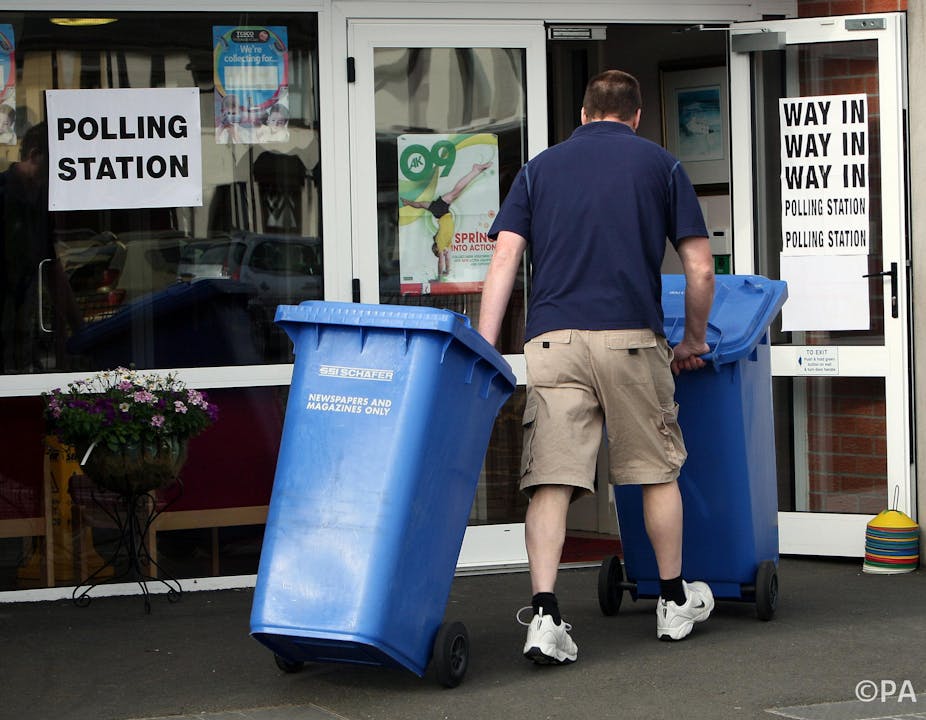Public sector procurement isn’t sexy, but it is important. Government purchases approximately £120 billion worth of goods and services from third parties every year. That’s more than £4,000 per UK income taxpayer.
The range of goods and services procured by the public sector pervade every aspect of our lives: the rubbish that was collected from outside my door, to the pothole that ruined my car’s suspension, or the school meal my son will eat at lunchtime. And when procurement goes wrong we all hear about it, such as the scrapped £12.4 billion NHS Connecting for Health programme, or the failure of G4S to supply security services to the London 2012 Olympic Games.
If, like me, your local council provides a multitude of brightly coloured bins to help you separate your recycling, garden and general waste then they’re simply wasting money. Local authorities could save £5 per wheelie bin if they bought plain black or grey bins with coloured lids instead. While this doesn’t sound much, Birmingham City Council just bought 400,000 of them at a saving of £2m simply by changing the colour. And as local authorities buy more than £58 billion worth of goods and services every year – roughly a quarter of their budget – there is room for substantial savings.
To date, action from central government has been weak and largely limited to directives and campaigns such as the Department of Communities and Local Government’s (DCLG) 50 Ways to Save.
It claims local government could save £1.2m from cancelling “away days in posh hotels and glitzy award ceremonies.” Yet while it is shocking that Leeds City Council recovered £500,000 from suppliers that it had paid twice, and that The London Borough of Ealing gained an additional £1.5m from identifying fraudulent applications for the single person council tax discount, this is “small beans”. Some of the DCLG’s suggestions are frankly silly, such as the suggestion that councils open up coffee shops in libraries or end the subsidisation of staff canteens. These will generate tens of thousands of pounds at best. Such initiatives are big on rhetoric but short on action and support to achieve these savings.
The House of Commons’ Communities and Local Government Select Committee has released a report on its inquiry into local government procurement. The report and the attached evidence paints a sorry tale of underachievement yet highlights some best practice which, if scaled up, could generate savings of 15-30% per annum – or up to £24 billion. For example, the Eastern Shires Purchasing Organisation – the UK’s largest public sector purchasing organisation – purchases approximately £1 billion worth of goods per annum. It has saved local authorities alone £19.9m on £434.8m worth of expenditure in the past 2.5 years.
The report articulates the need for procurement to be more than about delivering cost savings for councils. Local authorities must also achieve other local and community objectives through procurement, reduce the burdens on businesses and partners, and reduce fraud.
Localism vs efficiency
Small and large businesses alike were vocal in their complaints about the needless bureaucracy involved in public sector procurement processes. The report claims that councils “over-zealously” apply EU legislation making tendering overly complex and burdensome, and that a harmonised tendering process across councils could reduce the cost to tendering organisations by £1-2m per annum. For instance, there is no common pre-qualification questionnaire for tenderers across the public sector: a simple example of inefficiency.
The report argues that the need for local authorities to maximise social value under the Public Services (Social Value) Act, as well as to deliver community objectives such as to support the local economy, increase employment, and support small enterprise may conflict with cutting costs through more centralised or coordinated procurement. Group tendering at a regional or national level removes councils’ ability to use their market power to support the local economy.
There is a tension therefore, between the recent trend towards localism, devolved responsibility and decision-making, with the desire to centralise procurement to deliver savings. Should local authorities be free to deliver on local priorities such as support small, local enterprise at the expense of free, competition and increased efficiency? Are we aware of the implication of doing so? These savings could be used to build more schools, or better ones, or even to simply reduce our tax bill to be spent on a little holiday.
Ultimately, local authorities need more support from central government. The select committee asked Baroness Stowell, the permanent undersecretary at DCLG, why they are only spending £6m through the transformation fund when they think it could achieve £1 billion in savings. This is a very good, but as yet, unanswered question.
Local authorities need movement away from the type of “quick wins” identified in the DCLG’s 50 Ways to Save and a focus on “big wins”. More importantly they need some leadership from the centre. Yet the report calls on the Local Government Association and councils themselves to implement its recommendations. It cautions against the centralisation of procurement but encourages local authorities to voluntarily collaborate.
So we need to talk about procurement, even if it isn’t riveting conversation, because it has big implications.

